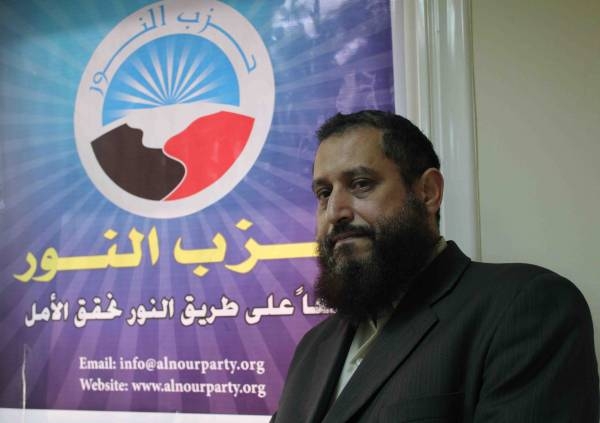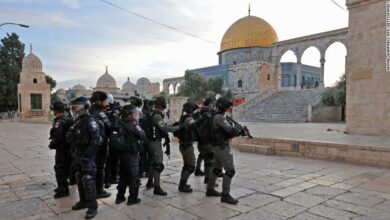
The head of Egypt's leading ultra-conservative Islamist party believes it will take time for the ruling military to hand power to civilians but says the army cannot enjoy a privileged status "above the constitution."
In an interview with Reuters, Emad Abdel Ghafour said the next president should enjoy broad support to steer Egypt through the turbulent transition it has witnessed since President Hosni Mubarak was toppled in a popular uprising last year.
He also praised the work of a US-based democracy group being investigated by the authorities, saying it had enriched political life.
For a representative of a movement that has defined itself by opposition to all things Western, his remarks on the role of US-backed NGOs under threat were remarkably positive.
Abdel Ghafour's Nour Party won more than a fifth of the seats in the newly-elected Parliament, taking many by surprise and making it the biggest of the ultraconservative Salafi groups to have emerged in the year since Mubarak was swept from office.
The military council which assumed power from Mubarak has pledged to hand power to an elected president by mid-year.
"What we say is they must hand over (power) now, but let us be realistic, this will take time," Abdel Ghafour said during an interview this week at his office in the Cairo suburb of Maadi on the east bank of the Nile.
"This is the truth that separates our vision from the youth," he said, referring to protest groups that are demanding the military's immediate departure from power.
The Salafis are ultra-orthodox even among fundamentalists, employing the beliefs and practices of the earliest period of Islam as a shield against what they see as Western pollution and modernist deviation.
The Salafi ideology is akin to the Wahhabi strain of puritanical Islam espoused in Saudi Arabia and which has inspired the militancy of Al-Qaeda and others. Many of their critics say the Salafis are financed with Gulf Arab money, a charge Abdel Ghafour dismissed.
The Supreme Council of the Armed Forces has said it will hand power to an elected president at the end of June, though activists demanding fast democratic reform worry the generals will try to exercise control from behind the scenes.
Abdel Ghafour said an assembly due to write Egypt's new constitution would insist on "the army being an important and great institution."
"But it must be subject to the rule of the nation and the law and the constitution," he said.
Since army officers overthrew the monarch in 1952, all of Egypt's presidents have hailed from the military, something reformists say has helped the institution to develop extensive political and economic influence.
The Islamists have angered other reformists for appearing too supportive of the army-led government during a year that rights groups say has seen civilians sent to military trials at rates not even witnessed in Mubarak's days.
The Nour Party had criticized the military council "in many matters," Abdel Ghafour said. But he praised the army for overseeing Egypt's most democratic elections in six decades.
Enriching political life
He said the Nour Party attended training organized by the National Democratic Institute — one of the US-based democracy groups whose workers are accused of breaking the law by operating without proper licenses and receiving foreign funds illegally.
The case has strained ties between the United States and Egypt, endangering the annual $1.3 billion in military aid Cairo receives from Washington.
"The things that we took part in were things that I do not think broke the law, for example, measuring public opinion … and monitoring party manifestos," Abdel Ghafour said. "There's no doubt it was a type of enrichment of political life."
Asked about what might be motivating the case, he said: "It seems it is mixed: procedural and political."
The Nour Party came second only to the Muslim Brotherhood, the long-established Islamist group that emerged with more than 43 percent of the seats in Parliament. Though both Islamist groups, the parties have appeared more rivals than allies.
Abdel Ghafour, who has the long beard that marks out Salafis, said the Brotherhood had steered clear of the Nour Party in an attempt to project a moderate image.
Like the Brotherhood, the Nour Party has so far decided not to field a candidate for the presidential election. Abdel Ghafour attributed that decision to a desire to ease the fears of other Egyptians alarmed by the Islamists' election success.
Egypt needs a Charles de Gaulle
The new head of state must be able to "lead an Egypt in which there is consensus among the political blocs," he said. But the candidate must not be opposed to Islamic Sharia law "in political life," he added.
Abdel Ghafour said he saw nothing wrong with the widely-accepted constitutional clause describing the principles of Sharia as the main source for legislation, as long as it was better applied. More hard-line Salafis want the clause changed to demand tight adherence to the letter of Islamic law.
Abdel Ghafour said his party would not force conservative changes on Egypt, such as segregating girls and boys at school or in the work place.
"I do not support obliging the people to (adhere to) a specific system," he said. "This is a matter that can be left to the people."
Addressing the tourist industry that employs one in eight Egyptians, he said talk that the party wanted to segregate beaches, for example, aimed to "distort" its reputation.
He criticized what he described as the Mubarak regime's failure to develop the tourism industry. "If we compare the pyramids with the Eiffel Tower in France, we find a great difference between the services provided," he said.
He also saw France as a model in another way, naming Charles de Gaulle as a foreign leader he admired.
"In Egypt, we need someone like this … who can gather the nation around a strong national feeling that can get Egypt out of the crisis it is in," he said.




